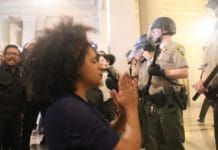by Scott Braley
Editor’s note: The Bay View agrees with Scott Braley on opposing the recall of Tracy Rosenberg, board member of KPFA 94.1 FM radio and of the Pacifica network KPFA founded 65 years ago. We’re posting this commentary in support of Tracy and also because Scott’s observations are important to the controversy over the morning program lineup that will be debated Wednesday, March 28, 2 p.m., at a staff meeting to be held in the station, located at 1929 Martin Luther King Jr. Way, Berkeley. A memo to the staff from interim General Manager Andrew Phillips follows this commentary.

This is not about personality clashes, and this is not the left shooting itself in the foot. This is about two completely different views of what KPFA should be.
KPFA Worker/Save KPFA believes that the station should be run by the paid staff, with some input from longterm unpaid programmers. They believe that the Local Station Board (LSB) which includes elected members from paid staff, unpaid staff and the community, should be an advisory body only. This is their clear position, with which I do not agree.
The loosely affiliated “community view,” which Tracy Rosenberg represents, and which I agree with, wants a station that is directly responsible to the listeners and the greater community, as well as the paid and unpaid staff. Tracy is being attacked because she has been a tireless advocate for new communities and new voices on the air.
Along with a lot of you, I tried to get KPFA out of its worn-out rut, so we fought for a Local Station Board where all the stakeholders had representation in deciding what the station should be and how it should be run.
Before the Mary Francis Berry takeover attempt in 1999, the station was run, in practice, by the paid staff, with longterm unpaid programmers having some influence in decisions. Pacifica stations (WBAI in New York City, WPFW in Washington, D.C., KPFT in Houston and KPFK in Los Angeles) generally were run by the various paid staffs and longterm programmers.
In both cases there was an unspoken, or possibly spoken, agreement that if longterm programmers and staff didn’t rock anyone else’s boat, they could keep control of their airtime and their jobs – essentially, forever. And in fact, many programs have been on the air for decades. There have periodically been attempts to revive the Program Council, in which stakeholders from the community, paid staff and unpaid staff devise some agreed upon basis for evaluating programs, decide whether they should continue, or if that airtime should be opened up to new programs and, if so, what should the new programs be?
The Program Council and the evaluations have been constantly dragged down and dismembered. Why? Well, partly because it is always difficult to get anything decided at KPFA, but mainly because if there were real evaluations, it would be very hard to argue that a program which had been on the air for two or three decades should keep its airtime when there are so few programs for the Black community, for analysis of political trends in Asia, for new forms of music, for the Occupy/Decolonize Movement, for any number of younger people who yearn to get on the air.
It would be very hard to argue that a program which had been on the air for two or three decades should keep its airtime when there are so few programs for the Black community, for analysis of political trends in Asia, for new forms of music, for the Occupy/Decolonize Movement, for any number of younger people who yearn to get on the air.
I’m not saying that any of this is monolithic. Some paid staff are not part of “KPFA Worker.” And lots of unpaid programmers do not line up with any tendency. I am not saying that individuals on any side of this argument are terrible people – or perfect people. I like many, heck, I like most, of the programs and programmers who have been on-air for decades. Some of them do great work. But what I personally like, as a 65-year-old white progressive, is not a viable demographic to build either the left or the New California.
KPFA is a community station. Or should be. Personal friendships or love of a certain program should not be the deciding factor about how KPFA is run. The attempt to recall Tracy Rosenberg is based in the desire for everything to continue as it has for decades: Decisions will be made by the people who owe their paychecks and their airtime to each other – much of the paid staff and some of the longterm unpaid programmers.
If Tracy is recalled, we will not have a “community” station. We will have a “listener-supported” station. There is a big difference. And in an era of increasing militarism and repression, I think we need a station that is responsible to the community, as well as to its staff, paid and unpaid.
In an era of increasing militarism and repression, I think we need a station that is responsible to the community, as well as to its staff, paid and unpaid.
Join with Joy Moore, David Barsamian, Mary Berg, Dennis Bernstein, Tanya Brannan, Bonnie Falkner, Maria Gilardin, Noelle Hanrahan, Jack Heyman, Mesha Irizarry, Barbara Lubin, Adam David Miller, Miguel Molina, Robbie Osman, Michael Parenti, Andrea Pritchett, Mary Ratcliff, Art Sato, Carol Spooner, Dave Welsh, Joe Wanzala and many others. Please vote NO on the recall of Tracy Rosenberg. She has been a tireless (unpaid) worker for democracy and community radio.
Go to stopthekpfarecall.org for more information, and feel free to email me to discuss this, at scottb@igc.org.
Proposed changes in KPFA morning programming
by Andrew Leslie Phillips, general manager (interim), KPFA Pacifica Radio 94.1FM
Note: These issues will be discussed at two staff meetings this Wednesday, March 28, at 2 p.m. and 7 p.m., and your input is welcome.

Mornings 6-10 a.m. in the winter fund drive came up shorter than usual this year. Al Jazeera (6-7 a.m.) has been receiving very little support for some time now and Democracy Now (7-8 and 9-10 a.m.) has not been as strong as in the past.
The Morning Mix (8-9 a.m.) has been improving and brings new community connections and diversity to the morning but the format comprising five different hosts is not usually a formula which works in a strip. On one hand the Morning Mix is authentic community radio and those who stepped up to contribute have done very well under difficult circumstances: new voices, new communities, new opportunities for unpaid staff. But we have not been able to build audience numbers and income sufficient to meet the expectations of the overall morning drive time slot.*
With all of the above in mind, I am proposing substantial changes to the weekday morning line-up. We are considering dropping Al Jazeera, which will open an hour in the morning. We are considering moving Democracy Now to 6 a.m., which opens 7 a.m. for a new morning segment.
I suggested the News Department move some resources to the morning where the largest potential audience is. I believe if we make this change, the wider audience will acknowledge we are trying to reach a successful compromise to enable KPFA to move forward and hopefully increase our morning drive revenue stream.
There are two proposals:
1) News Department produce hour 7-8 a.m., to help develop a new KPFA morning program. The Morning Mix remain at 8 a.m.
2) News Department produce hour 7-8 a.m., to help develop a new KPFA morning program. Mitch Jeserich and Letters and Politics move to 8 a.m., which opens the hour at 10 a.m., where Letters currently is.
- 6-7 a.m.: Democracy Now
- 7-8 a.m.: KPFA Morning News Program produced out of KPFA News Department
- 8-9 a.m.: Letters and Politics with Mitch Jeserich
- 9-10 a.m.: Democracy Now
- 10-11 a.m.: Against the Grain three days, plus Project Censored
- 11-Noon: Morning Music
- Noon-1 p.m.: Talk Back with unpaid staff hosts
In terms of the kind of morning news program, a combination of latest overnight headlines, Al Jazeera segments as appropriate, current previous day news freshened with live updates. One host doing phoners with news makers, mostly local. It should have time checks and weather – perhaps three 7-minute segments, perhaps 4, maybe one live guest but not the whole show. Of course, it would be flexible within form. Like the evening news, there could be rotating hosts. There should be time for promos: 2 minutes. This would apply to Morning Mix too.
This is a summary of what has been discussed so far. These issues will be discussed at two staff meetings this Wednesday, March 28, at 2 p.m. and 7 p.m., and your input is welcome.
Andrew Leslie Phillips, general manager (interim) or KPFA Pacifica Radio 94.1FM, can be reached at andrew@kpfa.org or (510) 848-6767, ext. 203. To listen to KPFA, tune your radio to 94.1FM or go to www.kpfa.org.
*One Morning Mix host, Minister of Information JR Valrey on Wednesdays, consistently met or exceeded his fundraising goal. He also increased listenership, especially from communities of color, more substantially and more quickly than any host in memory.

 Store
Store







